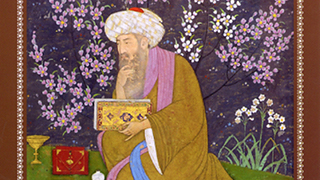Inside the Core
Friday, October 24, 2025
 Inside the Core this week, many faculty are covering Islamic texts, including Ibn
Tufayl’s Ḥayy bin Yaqẓān, a twelfth century “philosophical romance” as it is called in Brittanica, telling the story of a feral child raised by a doe. Ibn Tufayl was born in Spain in
1109/10 and died in Morocco in 1185/86. He was interested in Islamic philosophy, a
relatively new development in his time. In Core II, we read the work of Ibn Rushd
(Averroes), who was also a scholar of Islamic philosophy in the same period. During
this time, the works of Aristotle were being brought into Europe, first by Islamic
scholars and soon by both Jewish and Christian scholars (like Moses Maimonides and
Thomas Aquinas, respectively). All three faith traditions cultivated bringing philosophy
into their ways of thinking about faith without, in any of the cases, abandoning the
faith. Rather, the “pagan” philosophy was used as a way to deepen the philosophical
understanding of each faith tradition.
Inside the Core this week, many faculty are covering Islamic texts, including Ibn
Tufayl’s Ḥayy bin Yaqẓān, a twelfth century “philosophical romance” as it is called in Brittanica, telling the story of a feral child raised by a doe. Ibn Tufayl was born in Spain in
1109/10 and died in Morocco in 1185/86. He was interested in Islamic philosophy, a
relatively new development in his time. In Core II, we read the work of Ibn Rushd
(Averroes), who was also a scholar of Islamic philosophy in the same period. During
this time, the works of Aristotle were being brought into Europe, first by Islamic
scholars and soon by both Jewish and Christian scholars (like Moses Maimonides and
Thomas Aquinas, respectively). All three faith traditions cultivated bringing philosophy
into their ways of thinking about faith without, in any of the cases, abandoning the
faith. Rather, the “pagan” philosophy was used as a way to deepen the philosophical
understanding of each faith tradition.
Ḥayy bin Yaqẓān is a beautiful tale making a philosophical and religious point. The child, despite no contact with humans or any part of the outside world for many years, manages to become aware of the concept of a Creator and moves toward embracing a theistic life, without any religious upbringing at all. Though he does meet some humans once he is an adult, he has already had a kind of religious formation by studying nature. Also the loving care given to the boy by the doe is indicative of the nurturing power of nature in the most personal sense. She lovingly meets the child’s needs, allowing him to survive, truly becoming his adoptive mother.
As a campus Seton Hall is focusing on Pope Francis’ Laudato Si, in which he calls the Earth, “our common home.” Ibn Tufayl’s text depicts the earth and its creatures literally making a safe home for the lonely child. In the spirit of inter-religious dialogue, we might ask ourselves what these two texts, one very contemporary and the other medieval, have to say to each other. In fact, this month Pope Leo XIV’s prayer intention is “that believers in different religious traditions might work together to defend and promote peace, justice and human fraternity.” As part of that worthy goal, studying texts from different religious perspectives and looking for common ground can be a wonderful first step in working together toward the goals of peace, justice, and fraternity mentioned in the prayer. The works of Ibn Tufayl, the twelfth century Islamic writer, and Pope Francis make a great place to start.
Categories: Education






